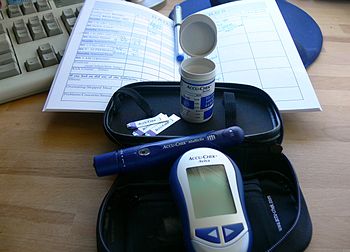 |
| A kit used by a woman with gestational diabetes. (Photo credit: Wikipedia) |
Basically, gestational diabetes is a disease that can come on during pregnancy but that usually disappears once the baby has been born. In some women, pregnancy results in their blood sugar levels getting out of balance. A pregnant woman might realize that she is having blood sugar problems on her own or it might take a doctor to determine that her levels are not normal. Regardless of how it is discovered, gestational diabetes is a serious issue that needs to be handled with caution and care throughout a woman's pregnancy and after.
When my sister-in-law and my closest friend were struggling with feeling abnormally up and down during their pregnancies, their doctor took blood tests and determined that their blood sugar levels were being affected by their pregnancies and their food choices. They were both diagnosed simply by having this blood work done. At first, they were hesitant and scared because gestational diabetes sounded huge and they didn't know how relatively simple the treatment process could be.
Gestational diabetes , because it is primarily an imbalance of blood sugar, can often be regulated by changes in diet and levels of exercise. The number of changes that are necessary is dependant upon how poor of habits the women have to begin with. My sister-in-law and my friend had to make different levels of changes to their diets, but neither had to make such significant changes that their lifestyle was radically altered. Mostly their changes consisted of going on a low-sugar and low-carb eating plan. Gestational diabetes brings a risk of the baby getting too large during its gestational period and needing to be delivered early or by c-section. The more the pregnant mother cuts down on sugar intake, the less likely it is that the baby will get too large to be delivered vaginally.
, because it is primarily an imbalance of blood sugar, can often be regulated by changes in diet and levels of exercise. The number of changes that are necessary is dependant upon how poor of habits the women have to begin with. My sister-in-law and my friend had to make different levels of changes to their diets, but neither had to make such significant changes that their lifestyle was radically altered. Mostly their changes consisted of going on a low-sugar and low-carb eating plan. Gestational diabetes brings a risk of the baby getting too large during its gestational period and needing to be delivered early or by c-section. The more the pregnant mother cuts down on sugar intake, the less likely it is that the baby will get too large to be delivered vaginally.
If you are pregnant or are thinking of becoming pregnant in the near future, take some time and learn about ways to prevent gestational diabetes. It is the best for you and your baby. Prevention is always a better option than having to find a solution to high blood sugar levels. Be wise with your food and exercise choices from the start and you should be able to avoid dealing with gestational diabetes in your pregnancies. Talk with your doctor and take every possible precaution.

No comments:
Post a Comment